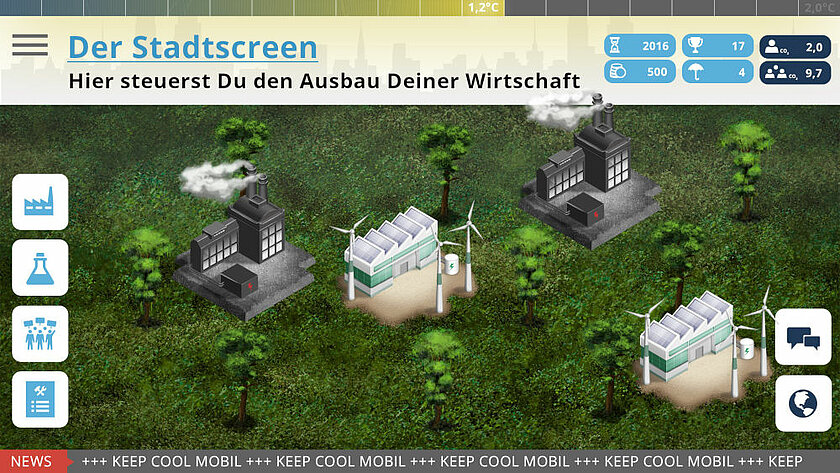New York, Tokyo or Rio de Janeiro - in KEEP COOL mobil the players take over the leadership of global metropolises. They shape the growth path of their economy and participate in research projects on technologies such as wind power, photovoltaics or energy storage. They deal with political demands, e.g. from environmental associations and citizens, and influence the decisions of international climate conferences. Cities are being hit by the consequences of climate change with dramatic effects; with adaptation or protection measures, this can be prevented to a certain extent. Starting in the year 2000, the players have to constantly weigh up the economic interests of their own city against the global climate protection goal over the course of 100 game years - the temperature display in the game shows whether the balance has been achieved. The game design was originally developed by Prof. Dr. Klaus Eisenack, Nils Marscheider and other project participants at the Humboldt University in Berlin for use in schools, for example.
Playfully exploring CO2 emissions trading
"With additional elements, individual topics can be taken up flexibly and discussed in an economic context with a high degree of practical relevance," reports HNU professor Gutiérrez. He has repeatedly used the game as a programme item in his current practical week, this time with parallel interaction in Zoom. As an additional component, Prof. Gutiérrez developed a concept for CO2 emissions trading, which was carried out via Zoom. The concrete determination of a market price for the CO2 certificates and the submission of offers to sell and buy took place in the main Zoom session. For individual negotiation processes, students could withdraw to the breakout sessions or use the chat. Even though certain simplifications were naturally necessary in the context of a game on CO2 emissions trading, the implementation nevertheless made it possible to experience the current discussion on the pricing of CO2 in a playful way. In particular, by limiting the quantity of certificates, it was possible to delay reaching the 1.5 degree mark in the game until about the year 2055 and finally to limit the simulated global warming to 1.8 degrees in the year 2100.
The climate researcher Dr Richard Knoche - formerly at the Institute for Meteorology and Climate Research, Atmospheric Environmental Research (IMK-IFU, KIT Karlsruhe Institute of Technology) - deserves thanks for his multi-layered guest lectures on climate change as well as on global climate scenarios and possibilities for limiting climate change. This made it possible to create a sound climate science framework for the implementation of the simulation game.
Sources and further links
Image source "The City Screen": http://www.climate-game.net/keep-cool-mobil/ (opens in a new window)and Carl von Ossietzky University Oldenburg
About the game KEEP COOL mobile: https://www.climate-game.net/keep-cool-mobil/ (opens in a new window)
Report of the Intergovernmental Panel on Climate Change (IPCC) (summary): IPCC, 2021: Summary for Policymakers. In: Climate Change 2021: The Physical Science Basis. Contribution of Working Group I to the Sixth Assessment Report of the Intergovernmental Panel on Climate Change [Masson-Delmotte, V., P. Zhai, A. Pirani, S. L. Connors, C. Péan, S. Berger, N. Caud, Y. Chen, L. Goldfarb, M. I. Gomis, M. Huang, K. Leitzell, E. Lonnoy, J.B.R. Matthews, T. K. Maycock, T. Waterfield, O. Yelekçi, R. Yu and B. Zhou (eds.)]. Cambridge University Press. In Press. (Download at https://www.ipcc.ch/report/sixth-assessment-report-working-group-i/ (opens in a new window). A German translation of the main statements from Working Group I's contribution to the IPCC Sixth Assessment Report is available for download at https://www.de-ipcc.de/media/content/Hauptaussagen_AR6-WGI.pdf (opens in a new window)).
IPCC website: https://www.ipcc.ch/ (opens in a new window). German coordination office: https://www.de-ipcc.de/ (opens in a new window)
(all above pages retrieved on 10.08.2021)
Contact at the HNU







